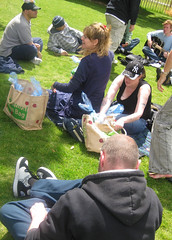Nettes is continuing to do agency work as a support worker in City College with adults with additional needs/learning difficulties as well as running a crèche for an ESOL group one morning a week for Karis Neighbour Scheme, a charity that has links with our church. Nettes is still also leading our church’s Sunday school. After a recent recruitment drive we have a few more workers. This is good as some children have come up from crèche and we are now running three groups rather than two. But that’s not all she does. After getting a Grade 2 in last year’s module she now has only one more year to go on her Open University Degree in Psychology.
 I am still teaching Psychology. This year the merger of Matthew Boulton College and Sutton Coldfield College to form Birmingham Metropolitan College was finally made official in September. As well as teaching some time in the sixth form I still have my evening class although because of funding issues it is not certain that this will continue next academic year. We both continue to visit our church’s drop in centre that grew out of the work with the homeless. Over the summer I went on a trip with them to Stratford. And this year I have taken over some responsibility for the church’s website.
I am still teaching Psychology. This year the merger of Matthew Boulton College and Sutton Coldfield College to form Birmingham Metropolitan College was finally made official in September. As well as teaching some time in the sixth form I still have my evening class although because of funding issues it is not certain that this will continue next academic year. We both continue to visit our church’s drop in centre that grew out of the work with the homeless. Over the summer I went on a trip with them to Stratford. And this year I have taken over some responsibility for the church’s website.Our little daughter Callie is now in Year 2 and is getting some glowing reports from school. This year she has enrolled in Rainbows. On her birthday she enjoyed a visit to Blakesley Hall with friends, and has had fun sleeping over with her friends on occasions. In the summer holidays she went to Stratford with Nettes and one of her college classes. They all had fun brass rubbing. Callie has just got back from Cadbury World which was a very special treat!
 This year as a family we went to Spring Harvest at Easter, which we all enjoyed very much. Nettes and Callie then went on from there to visit Callie’s friend Holly at Ashford in Kent. Over the summer we were very involved in our local community fun day, where Nettes ran a bric-a-brac stall. And then we went to the celebration event for our network of churches that was held in Swansea.
This year as a family we went to Spring Harvest at Easter, which we all enjoyed very much. Nettes and Callie then went on from there to visit Callie’s friend Holly at Ashford in Kent. Over the summer we were very involved in our local community fun day, where Nettes ran a bric-a-brac stall. And then we went to the celebration event for our network of churches that was held in Swansea.We regularly visit my mum Joyce who is in a residential care home in Birmingham. She is continuing to slowly decline in health. She is now in bed all the time being turned every hour and it doesn’t help having a broken leg that refuses to heal.
Anyway, Merry Christmas! Have a great one! God's richest blessings on you this season!




 Last weekend it was my privilege to join our church's leaders on a weekend away at
Last weekend it was my privilege to join our church's leaders on a weekend away at 





 Illegal rebellion in this way can be seen as a way of social change. Pirate radio stations originally transmitted new styles of music that the legal radio stations did not. But eventually Radio 1 was born. Similarly, illegal music downloads eventually gave way to legal ways such as
Illegal rebellion in this way can be seen as a way of social change. Pirate radio stations originally transmitted new styles of music that the legal radio stations did not. But eventually Radio 1 was born. Similarly, illegal music downloads eventually gave way to legal ways such as 






























